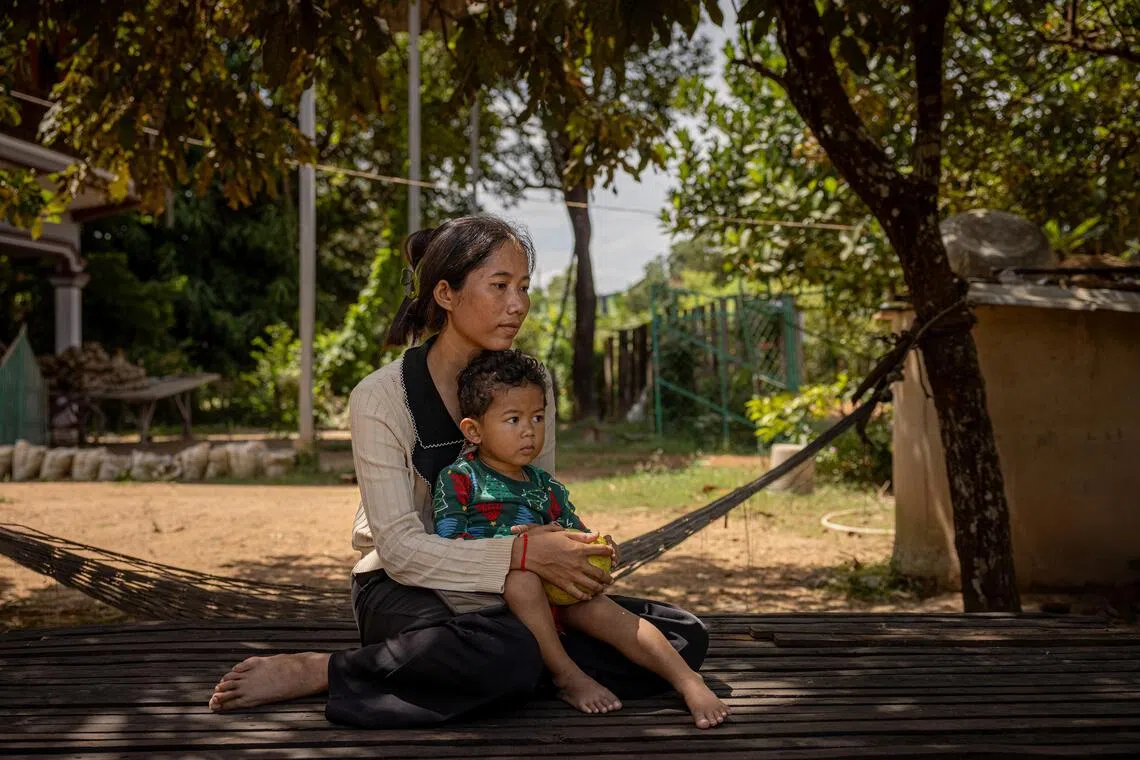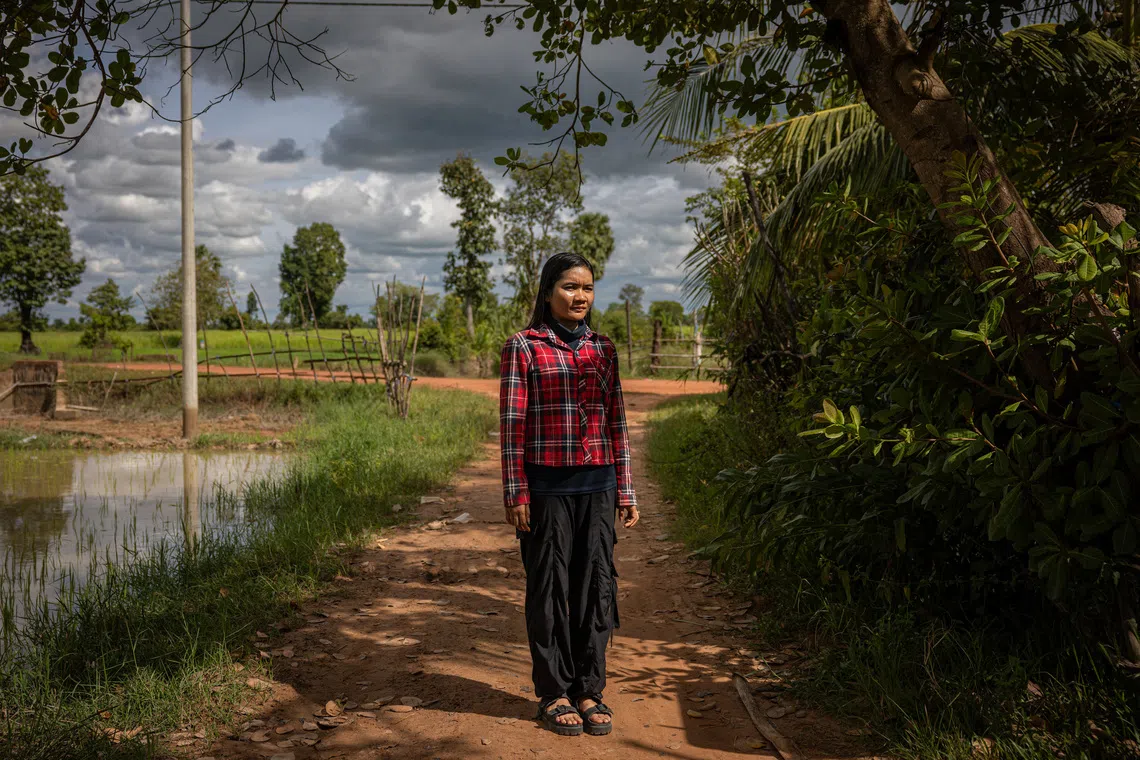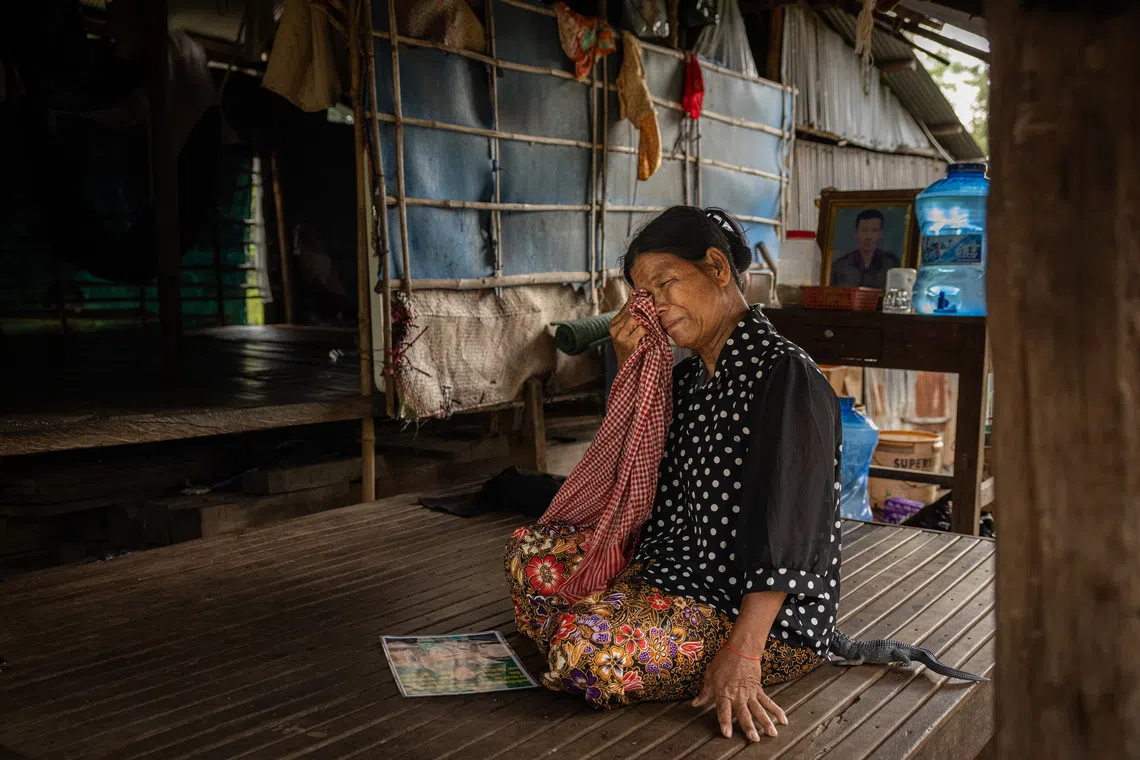In Trump, families of Cambodian troops detained by Thailand see hope
Sign up now: Get ST's newsletters delivered to your inbox

Cambodian villager Kruoch Ya, with her two-year-old son, says the survival of her prisoner-of-war husband depends on US President Donald Trump.
PHOTO: LAUREN DECICCA/NYTIMES
Sui-Lee Wee and Sun Narin
Follow topic:
SIEM REAP PROVINCE, Cambodia – “Papa” is the only word that two-year-old Ros Soveayo can say. But his father has not been home to Prey Thom village, Cambodia, in months.
His father, Mr Hong Chanvimean, is a prisoner of war (POW) in Thailand. He is one of 18 soldiers who were detained in July, after a border dispute between Thailand and Cambodia
But the truce remains tenuous, as does Mr Hong Chanvimean’s fate.
Now there is a glimmer of hope for him and the other POWs. On Oct 26 in Malaysia, US President Donald Trump – who has taken credit for ending the border dispute between Thailand and Cambodia – is expected to oversee the signing of a pact
It would come just weeks after a plan outlined by Mr Trump led to a ceasefire in the Gaza Strip and the release of the hostages held by Hamas.
“The survival or death of my husband depends on him,” said Ms Kruoch Ya, Mr Hong Chanvimean’s wife.
Cambodia expects the POWs to be released soon after a deal is signed. But Thailand had previously laid out four demands, including the resettlement of Cambodians living near the border, to agree to their release.
Still, both nations have agreed on guidelines for a withdrawal of forces and the clearing of mines. Those terms are likely to be outlined in Oct 26’s accord and could pave the way for a release of the prisoners.
The fate of the POWs has become a pressure point for the Cambodian authorities. It has inflamed public anger against Thailand, but has also underscored how little leverage Cambodia has against its much bigger neighbour.
After the soldiers were detained, thousands of people marched across several cities in Cambodia, calling for the release of their troops. They held up photos of the soldiers – as well as those of Mr Trump.
Ms Pek Thorn’s husband, Mr Leap Thea, is among the POWs. She and the family members of other detainees met Cambodian Prime Minister Hun Manet in September. He told them that the detainees were being held in good conditions but he could not predict when they would return home, Ms Pek Thorn said.
“I cry almost every day,” she said.

Ms Pek Thorn’s husband, Mr Leap Thea, is one of the prisoners of war.
PHOTO: LAUREN DECICCA/NYTIMES
Thailand says the POWs are being held lawfully. It has allowed the International Committee of the Red Cross (ICRC) to visit the prisoners several times, but the ICRC said it could not publicly comment on its observations, as per convention.
The conflict erupted along the Thai-Cambodian border on July 24, each side accusing the other of firing first. At least 40 people were killed, including civilians, and hundreds of thousands of others were displaced.
Within five days of the conflict, a ceasefire was reached. Malaysia, 2025’s chair of Asean, tried to broker a halt to the fighting on the first day. But it was Mr Trump’s involvement on the third day that gave the process greater momentum, according to a Malaysian official involved in the talks.
Cambodia had asked Mr Trump to intervene, according to the Malaysian official, who spoke on the condition of anonymity because he was not allowed to divulge details of the private talks.
The US President agreed, calling both leaders to tell them he would stop tariff negotiations if there was no end to the fighting.
“I said, ‘I don’t want to trade with anybody that’s killing each other,’ so we just got that one solved,” Mr Trump told reporters in September.
After the fighting ended, Cambodia nominated Mr Trump for the Nobel Peace Prize and talked about renaming a highway after him.
But the prospects of lasting peace are dim. The two sides have yet to discuss how to resolve the underlying issue of the dispute: how to define the border. They do not even use the same maps to depict the area.
After the ceasefire was announced on July 28, Ms Pek Thorn said she did not hear from her husband and scoured border areas for 10 days. Eventually, she saw a photo of him and other POWs on social media.
She said she felt a jolt of hope when she saw that Mr Trump’s intervention resulted in the release of the Israeli hostages in Gaza. She added: “I think after Trump has a meeting on the 26th, he’ll pressure Thailand, and they will be released immediately.”
Ms Men Kimly is hoping her third child will be freed by Thailand. She received a letter from him dated Sept 4, in which he wrote that he was sleeping in quarters that were comfortable and that he had enough food to eat.
He told his mother that he missed home and his four-year-old daughter very much.

Ms Men Kimly is hoping her third child will be freed by Thailand.
PHOTO: LAUREN DECICCA/NYTIMES
About a month later, he wrote again.
“I don’t know when I can return,” he wrote, according to the letter, which was written on a Red Cross letterhead, dated Oct 9 and seen by The New York Times.
“I miss you so much, mum.” NYTIMES

